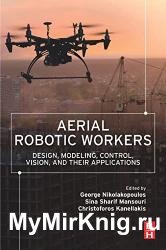 Название: Aerial Robotic Workers : Design, Modeling, Control, Vision and Their Applications Название: Aerial Robotic Workers : Design, Modeling, Control, Vision and Their Applications
Автор: George Nikolakopoulos, Sina Sharif Mansouri, Christoforos Kanellakis
Издательство: Butterworth-Heinemann, Elsevier
Год: 2023
Страниц: 282
Язык: английский
Формат: pdf (true)
Размер: 19.2 MB
Aerial Robotic Workers: Design, Modeling, Control, Vision and Their Applications provides an in-depth look at both theory and practical applications surrounding the Aerial Robotic Worker (ARW). Emerging ARWs are fully autonomous flying robots that can assist human operations through their agile performance of aerial inspections and interaction with the surrounding infrastructure. This book addresses all the fundamental components of ARWs, starting with the hardware and software components and then addressing aspects of modeling, control, perception of the environment, and the concept of aerial manipulators, cooperative ARWs, and direct applications.
The book includes sample codes and ROS-based tutorials, enabling the direct application of the chapters and real-life examples with platforms already existing in the market.
Addresses the fundamental problems of UAVs with the ability of utilizing aerial tools in the fields of modeling, control, navigation, cooperation, vision and interaction with the environment
Includes open source codes and libraries, providing a complete set of information for readers to start their experimentation with UAVs, and more specifically, ARWs
Provides multiple, real-life examples and codes in MATLAB and ROS
To reach the vision of the book in the future utilization of ARWs, the presented materials have been divided into two major parts. The first part focuses on the theoretical concepts around the design, modeling, and control of ARWs, while the second part deals with characteristic applications and demonstrations of the ARW utilization in realistic use cases.
As such, the first part will begin by presenting analytically the fundamental hardware modules that consist of the ARWs in Chapter 2, followed by establishing the most popular mathematical modeling and control approaches for ARWs in Chapters 3 and 4, respectively. In these Chapters, we have selected to highlight only the most popular modeling and control approaches that can be directly utilized in experiments as an effort to increase the overall focus and impact of the book. In the sequel, Chapter 5 will focus on the perception aspects of the ARWs. In contrast, Chapter 6 will initiate the integration of the previous Chapters into more complete and integrated missions, and thus it will consider the navigation problem of ARWs. Chapter 7 will discuss the exploration task for ARWs in demanding complex and GPS-denied environments, e.g., the case of sub-terranean use cases. Chapter 8 will analyze methods for measuring and estimating the external forces acting on ARWs, while Chapter 9 will purely focus on aerial manipulation, including modeling, control, and visual servoing tasks. Chapter 10 will conclude the first part of the book by presenting the latest machine learning (data-driven) approaches and applications in the area of ARWs, as an alternative approach to the classical modeling and control tasks, for increasing the capabilities and the utilization of ARWs in more application oriented missions.
The second part of the book will focus on real-life applications of ARWs, and as such, Chapter 11 will discuss establishing a framework for the collaborative aerial inspection of wind turbines based on multiple ARWs. Chapter 12 will present and analyze a complete framework for reactive (online) exploration of fully unknown sub-terranean environments and in full autonomy, while Chapter 13 will conclude this book by presenting an edge-based networked architecture for offloading fundamental algorithmic modules that are legacy performed on board an aerial vehicle, to the edge and as such increasing the overall performance and the resiliency of the mission.
Скачать Aerial Robotic Workers : Design, Modeling, Control, Vision and Their Applications
|